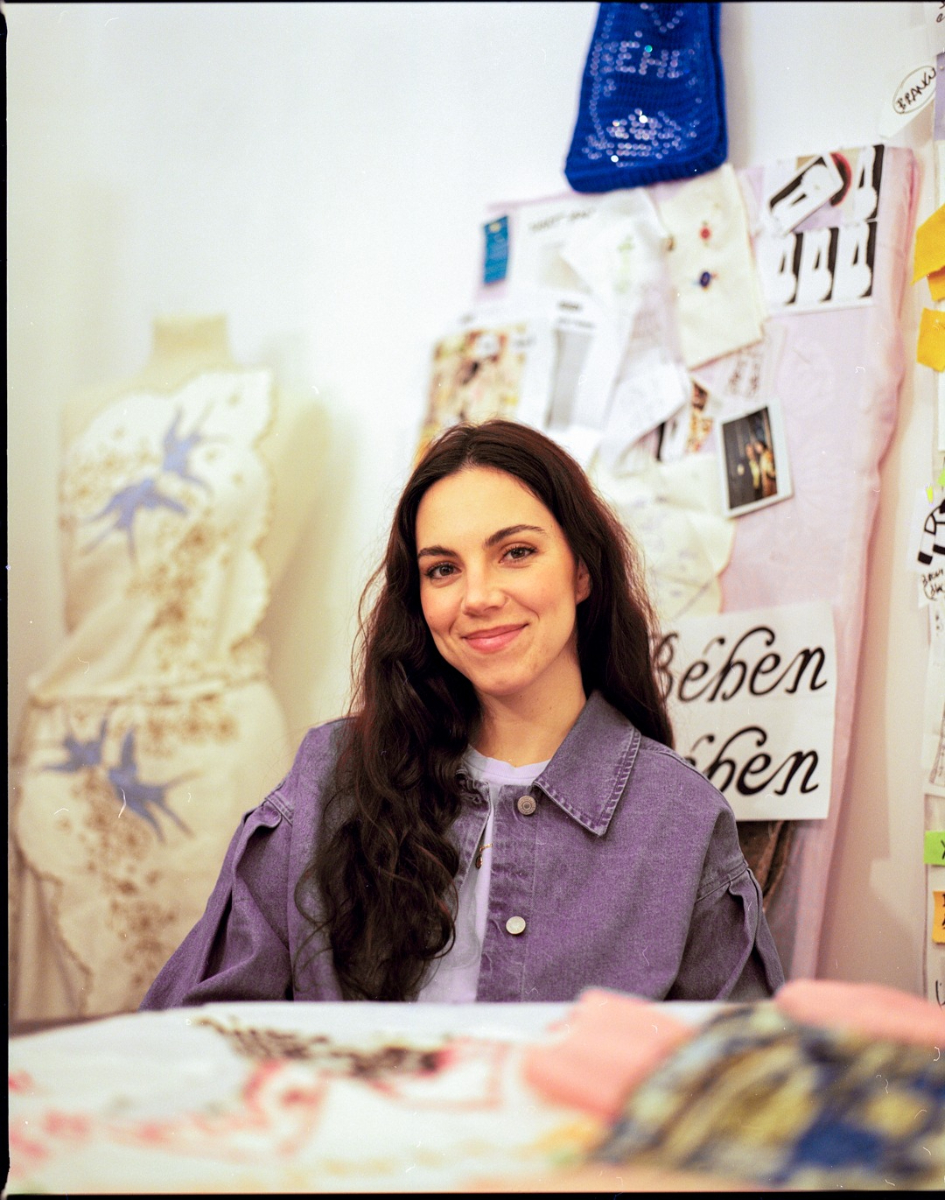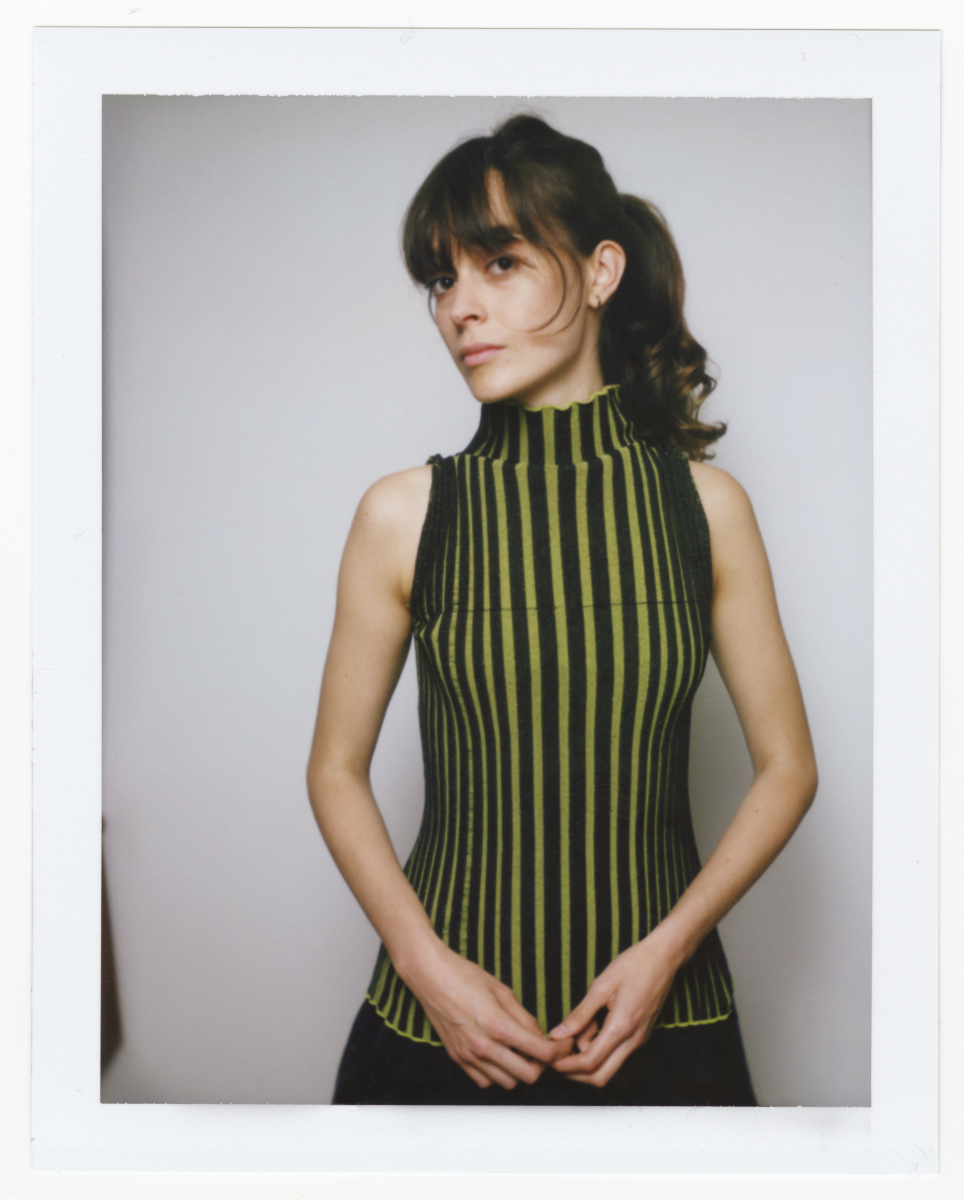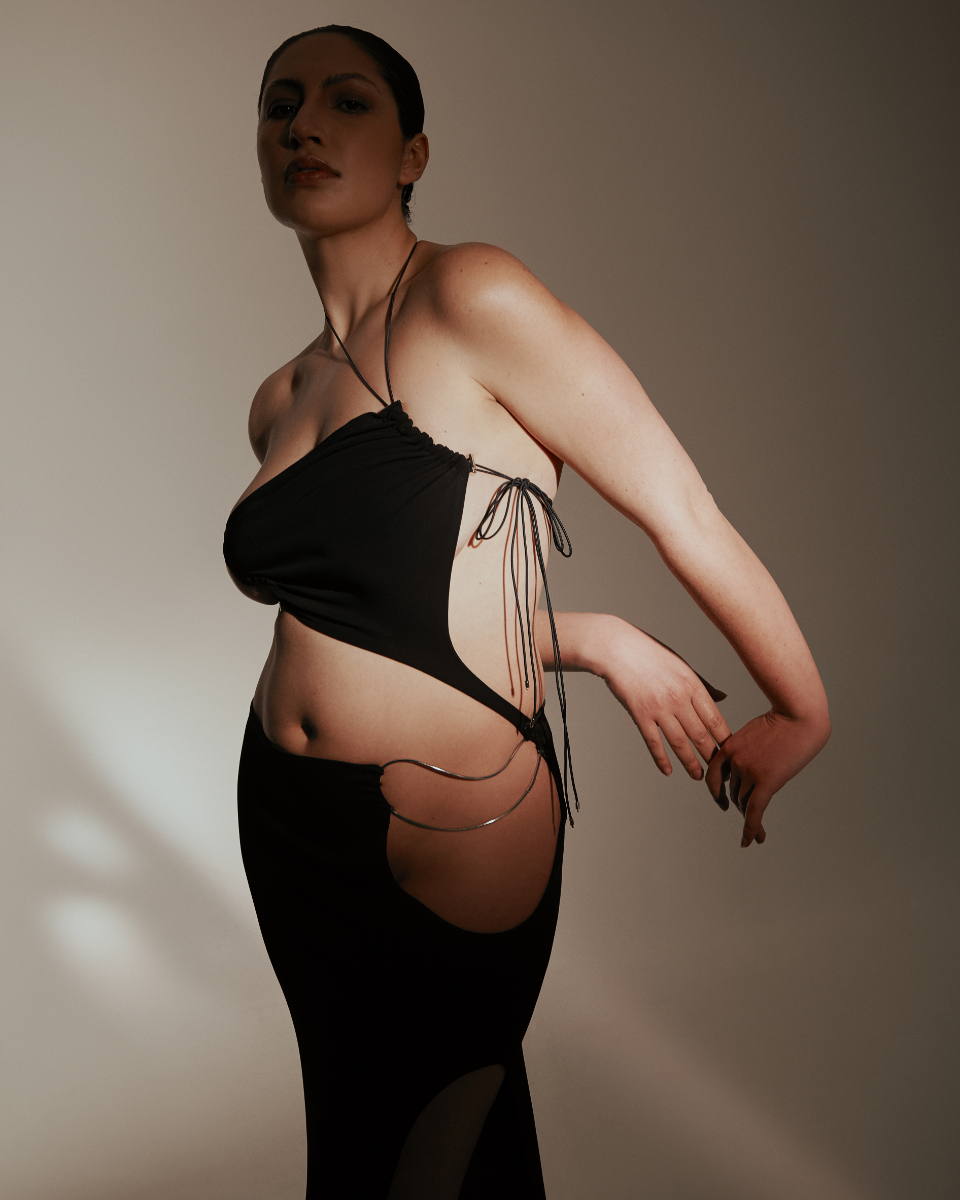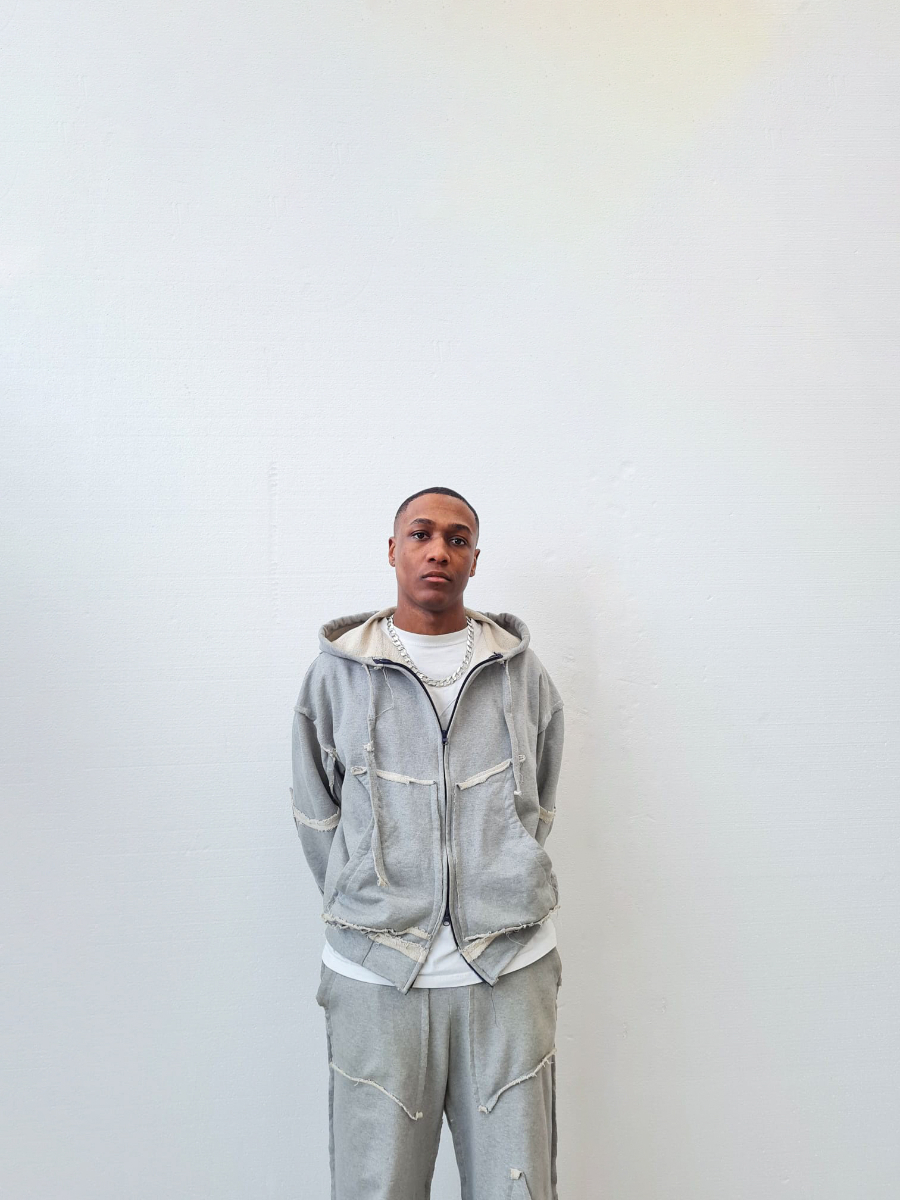Changing the world is not a simple task. It is a job reserved for those who dare to challenge the landscape around them. In the fashion industry, these are the agents of change, those bold enough to walk a self-trailed path.
Changing the world is not a simple task. It is a job reserved for those who dare to challenge the landscape around them. In the fashion industry, these are the agents of change, those bold enough to walk a self-trailed path. Designers like Joana Duarte, Karoline Vitto, Paula Canovas del Vas, and Yaku Stapleton are part of the generation that understands revolution as a verb conjugated in the future.
Joana Duarte

Picture by Diogo dos Santos
Picture by Diogo dos Santos
Change is often thought of as something that happens in the future, achieved through what is yet to be discovered. Joana Duarte proves the error of this conception by focusing on a sustainable and ethical approach to the practices of the past. Through the power of traditional Portuguese embroidery, the designer encourages communities, recycles existing materials, and revitalizes endangered traditions. Her brand, BÉHEN, is the materialization of the revolution Duarte catalyzes in fashion. Its name is a reflection of the designer's journey, inspired by the Hindi word for "sister". It was in India that her project began, when, by focusing on the social area of the industry consolidated her passion for the Portuguese textile tradition.
What do you want to change in the fashion industry? Nothing is done alone. I think of BÉHEN as a stage for all these arts that we work with, with two major goals: to create a close connection between the arts and the new generations, not only so that they will know how to appreciate them, but eventually to want to learn them and perpetuate them in time. and perpetuate them in time. And also so that the structures to recognize their economic, tural, and heritage potential for various and heritage potential for various industries.
What do you consider to be your greatest success to date? THE BÉHEN. The sense that BÉHEN was created based on a mission and values that go beyond the brand and that move me as a designer: the protection of traditional Portuguese arts. Today, my focus as a designer is BÉHEN, but this mission, being so big and so complex, can unfold in many other projects. How do you feel you can revolutionize Fashion? I believe in working with a purpose. I believe in the mission. I believe in producing with a greater purpose. As long as there is space, as long as it makes sense, I will work to continue to increase the Portuguese trousseau.
This edition of Vogue Portugal is inspired by the concept of revolution. What does revolution mean in your life? Everything. I see revolution as a positive transformation, even if it is not abrupt, and to take some of these arts out of the "shadow", oblivion, and domestic context to which they were accommodated and position them with the prominence they deserve is the revolution they needed. And it's already coming late because, in the blink of an eye, we lose material and immaterial heritage for lack of protection and recognition, of both of these techniques and of the people who know how to make them. The people are mostly women. The revolution in my life, the revolution at BÉHEN, is to tell the stories of all the women we come across. To give them a voice through what they do best so that it can be seen, touched, and recognized. So that they can finally feel valid and valued. That, yes, is Revolution.
Paula Canovas del Vas

Picture by Coco Capitan
Picture by Coco Capitan
We think of revolution as something that breaks, something that is interrupted to make way for something new, but definitions vary. Paula Canovas del Vas proves to us that the concept is much more human than we think, the fruit of the elasticity that only adaptation provides. The Spanish designer thinks of Fashion as something whose production will have to be sustainable, both environmentally and emotionally. The choice of words is ours, since Canovas del Vas hesitates to use the term sustainable, insisting, however, that her production has a strong sense of responsibility. His pieces are produced mostly with deadstock fabrics. Her approach allows us to understand fashion not as an industry, blinded by the promise of profit, but as a craft. Each piece produced by the designer is a reflection of a constant search for excellence. Her philosophy is apparent in her collaborations with artists, creatives, and artisans, which, because of their frequency, have already become part of her brand's DNA. Instead of being consumed by the suffocating competitiveness of Fashion, the Spanish designer prioritizes emotional sustainability. The team she has built is a reflection of this determination, to create a true family.
What do you feel has been your biggest achievement in your career?I wake up and I do what I want to with people I admire. That is the achievement.
Is there anything you would like to change about the fashion industry?Production! Can we please make it less painful? Also diversity, I was reading the other day about 80% of creative directors in the big houses are white men. That needs to change!
How do you feel like you can revolutionize the industry?I believe the key is in the manufacturing process. Making it more conscious and optimizing. There is so much waste, not only in terms of materials, but time, resources, shipping... We can be a lot smarter in the way we make our clothes.
This issue of Vogue Portugal is all about revolution. What does revolution mean to you?Change and being able to adapt to it. Changing your mind, I know a lot of people feel uncomfortable about retracting themselves, but there is nothing more human than being able to say "I was wrong, I changed my mind" and we need more of that!
Karoline Vitto

Picture by Lucas Fonseca
Picture by Lucas Fonseca
Diversity has become a word that by the exaggeration of its use has become devoid of any meaning. Karoline Vitto leads a new generation of designers prepared to remedy the sins of the past. Born and raised in Brazil, the young woman moved to London for her Master's in Fashion Design. It was there, in the British capital, that she established her eponymous brand. As a child, Vitto was aware of her body and how it diverged from what the world around her defined as beautiful. Now, gifted with the power to adjust definitions of beauty, the Brazilian designer honors the child she was. Her pieces, tight to the body, are inspired by the parts of the body that are undervalued. Vitto ennobles the parts of ourselves that we often are conditioned to hate.
What do you consider to be your greatest success to date? I think it was our first show at London Fashion Week. That was the moment I realized I was starting a new cycle, starting something much bigger. It was something I had always dreamed of. I always wanted to see a show where the women were of various sizes and diversities, not just the ones we are used to seeing. So this was something that made me very happy as a consumer, as a person, and also as a designer. I think it was a sign that the page is turning. And even though there will be new discussions like there was backlash for diversity in the runway shows of many brands, for the brands that have diversity in their DNA, the movement will never stop.
What change would you like to see in the Fashion industry? At the moment it's the way the big brand's approach diversity, tbrands a huge disparity. It doesn't make sense to me that it's the smaller brands that make the biggest difference. I always ask myself what is the problem. For small brands, as is our case, it is indeed challenging, but we make the necessary efforts because we know how important it is for the industry. What I see is that if we can do it, they [bigger brands], with their size, can also do it and more easily, they have more operation, more space, more structure. They have the power to hire specialists. It's no good having one or two looks on plus-size models. I also wish there was more incentive for the smaller brands. We are generating jobs and still creating a difference in the industry. But we need support to be able to continue to create this change.
This edition of Vogue Portugal is inspired by the concept of revolution. What does revolution mean in your life? For me, revolution always comes with breaking. You have to break something that is not working and bring something new that has not yet been seen and that proposes a new solution. I think that this break is very important. You have to start from scratch. There are also small revolutions. We see that sometimes many people are breaking small things in the industry, they are questioning small points and it seems that it will not change anything, but when you see this whole group together, you see that things can change. So to me, that's the revolution.
Yaku Stapleton

Yaku Stapleton is the youngest name on our list, but with a Central Saint Martins graduation collection featured in dozens of publications, the young Brit proves his potential. The innovation the designer represents is not rooted in his youth but in his design philosophy. Stapleton dared to create a world where Fashion is not just a futile prop but a visualization of what we embody as people. In his first collection, he proposes an interesting fusion between the idea of family, where each person assumes a "role," and the aesthetics of video games. The results are colorful creations and exaggerated proportions, where the human is interchangeable with the fantastic. His gift has been recognized by the biggest names in the industry. Stapleton was the recipient of the L'Oréal Professionnel Creative Award, selected by Ibrahim Kamara, creative director of Off-White.
What do you feel has been your biggest achievement in your career?It's hard for me to say what my biggest achievement in my career has been, as I feel like my journey has been a continuous momentum to which I dedicate myself. From the outside, someone might say winning the L'Oreal Creative Award at the graduate show, but for me, the biggest achievement is attacking every day with purpose.
Is there anything you would like to change about the fashion industry?I would like to see more transparency from designers in the fashion industry. I think that more clarity would help us gain a better understanding of the ways people are innovating for positive change that can be adopted on a larger scale. I think the general withholding of information isn't progressive. I think with a more open-source approach to creating, referencing can be made clearer so that we can understand a design's influences and see what differentiates it from the last. If we can be more open to teaching others about what we do, I think the environment in fashion can be a lot more positive for the planet and us as people.
How do you feel like you can revolutionize the industry?I want to break down the barriers to fashion and the arts. Providing opportunities for people to introspect themselves and reconsider how they look at the world has been a target of my work from its inception. Doing this by combining various references and collaborating with experts in their respective fields to produce work in different mediums hopefully provides these opportunities on a range of access points. These access points should be easy and open. Fashion isn’t scary, so people shouldn’t feel scared when going into a fashion environment.
This issue of Vogue Portugal is all about revolution. What does revolution mean to you?To me, revolution is the process of recognizing an issue and taking steps within my practice to create an example of how the issue can be solved. Being open to conversation and critique means these solutions can be refined and applied, resulting in change for the better.
Originally translated from The Revolution Issue, published April 2023.Full stories and credits on the print issue.
Most popular


Relacionados
.jpg)


LightHouse Publishing x Street Smash Burgers: uma noite no escritório da Vogue Portugal
19 Dec 2025
 (14).png)


